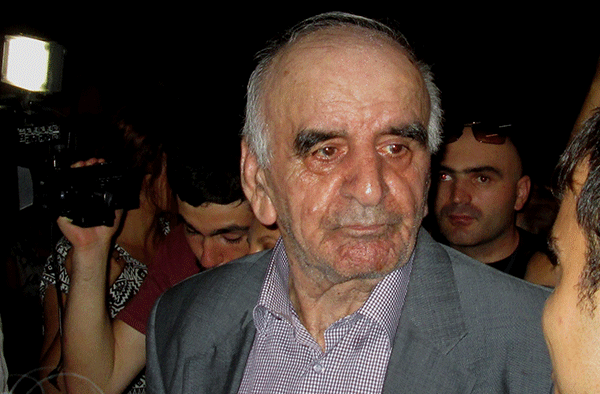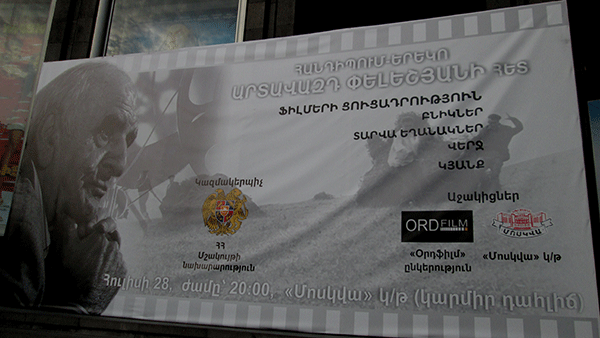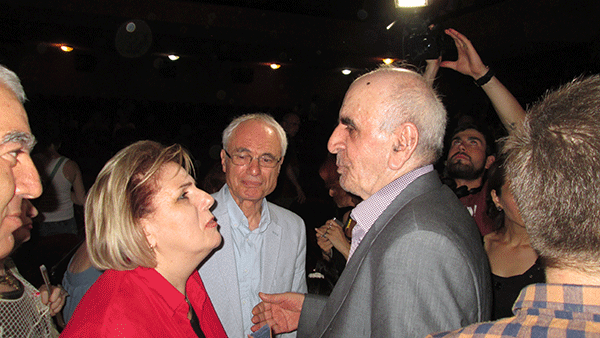On July 28, Artavazd Peleshian’s films were screened at the “Moscow” Cinema House and afterward, the Master answered the questions addressed to him, asking only to photograph and not to film anything. “I have shot the last films when Armenia was facing difficulties. These were gloomy and dark years. I think I made movies for the hope, light, rebirth and a new life,” said the maestro. He was giving a laconic answer to the questions, with his usual wit and depth. For example, to the question of whether on watching films in his younger years he was not thinking that they worth to be changed or edited otherwise, Artavazd Peleshian replied, “I am turning over the pages of the album and I see photos in which young peoples were wearing mustache, what’s the use of destroying these photos or erasing the mustache.”
Responding to another question, Peleshian listed his three favorite films: “The Quiet Don”, “The Godfather” and “The Story of Chinese Ghosts”. To the question of whether his film “The Natives” is about the Genocide, the master considered it strange. “It’s about the attitude of a man to the nature, we are sitting on the branch, which we are cutting with our own hands.” He did not elucidate why he has not made a film called “The Armenian World” based on his own script, he just said that there are financial reasons and then added, “Now I’m grown up and I do not know what I should do.” There was also a reference to his “Homo Sapiens”. “In the 90s, Jean-Luc Godard gave his producer to me, it turned out that my film requires 410 000 dollars to shot, but the producer was a woman and could not raise this fund,” said Peleshian half-joking and half-serious.
He also told a funny episode. “When I was shooting the film “The Seasons of the Year”, I sent the administrator and the operator to the Ministry of Agriculture to find out a village in Armenia that is far away from civilization, where the old and new traditions are preserved. It turned out that there is a village in the gorge of Zangezur, which was known only after the establishment of Soviet rules and the village, too, learned at that time that the Soviet regime has been established.” The Master tells that they barely reached the village and have seen the reality described in the fairy tales of Tumanyan, the first thing they met were three elderly men who did not even know what a film is. Peleshian filmed the villagers in the mass scenes, and when these people were called to pay 3 rubles for photographing in “Moscow”, one of the elderlies insisted, “I played a walk-on part and I should get paid more,” and they had to pay him 7 rubles 50 kopecks.
Peleshian also talked about Italian film director Pietro Marcello’s “Peleshian’s Silence” film. “It seemed to me that the film director shot the film to eventually disclose Peleshian’s silence, but he learned from me and became silent too.” The master was giving ‘yes’ and ‘no’ answers to banal and frothy questions, and after the screening of each film he was bowing before the audience and thanking for their patience. Peleshian’s films are named differently, but all of them can be placed under the title “The Life” because you can hear the powerful beat of the pulse of life in Peleshian’s “silent” films. The Peleshian event was also attended by another master, Tigran Mansuryan. “Peleshian’s victory is a victory of the film and for us, the victory of the Armenian spirit. Today, we highly need the victory of spirit in the Armenian world,” said the maestro. In his words, Peleshian’s permit card is our permit card in the world. “And if Peleshian gathers such a hall in this city, this makes the city become a capital”.
Gohar HAKOBYAN
























































